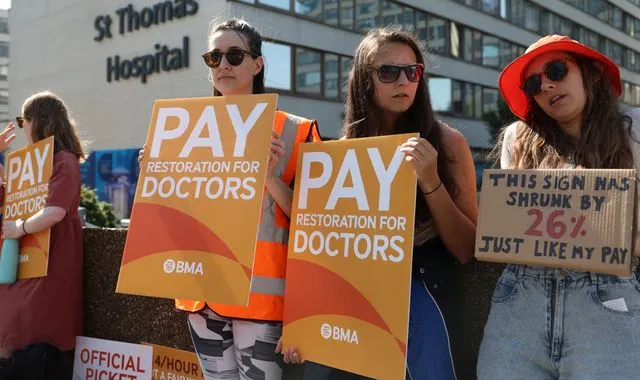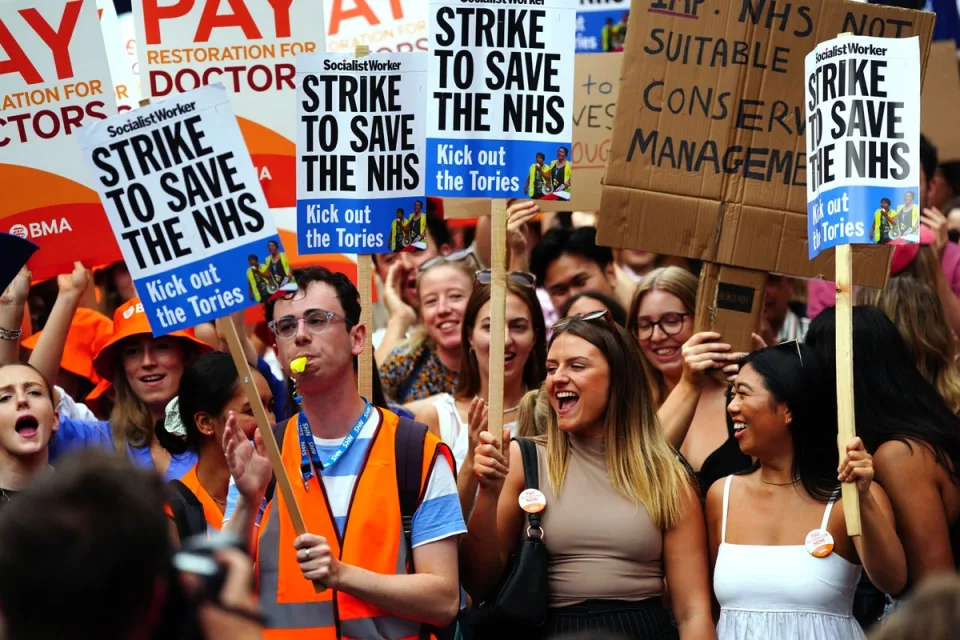Hospital corridor with empty waiting chairs, a group of doctors in scrubs holding picket signs, a crowded NHS outpatient department.
In a landmark move, junior doctors and consultants in England are set to stage their first-ever joint strike in the history of the National Health Service (NHS). The British Medical Association (BMA) has confirmed that the strike will unfold over four days in September and October, strategically coinciding with the Conservative Party conference scheduled to take place in Manchester.
This momentous strike is the culmination of a prolonged dispute revolving around pay and working conditions, exacerbated by the challenges brought about by the Covid-19 pandemic. The BMA asserts that doctors have witnessed their real-terms pay erode by as much as 30% over the past decade. Furthermore, the recent government proposal of a 3% pay increase is labeled as “insulting and inadequate” by the BMA.

Additionally, the BMA accuses the government of failing to address concerns relating to staff shortages, overwhelming workloads, burnout, and deteriorating morale, all of which have been exacerbated during the health crisis. Alarmingly, the union reports that over 8,000 doctors have left the NHS since March 2020, with many more contemplating similar decisions or considering reducing their working hours.
While the BMA insists that the strike will be “targeted” and “proportionate” with an unwavering commitment to patient safety, it is expected to cause disruption and delays for thousands of patients requiring elective surgeries, outpatient appointments, diagnostic tests, and routine care. The NHS is already grappling with a backlog exceeding 5 million patients waiting for treatment, a backlog primarily attributed to the pandemic and staffing shortages.

This strike has the potential to exacerbate tensions between medical professionals and the government, which could, in turn, influence future negotiations and cooperation on health policy. The government has publicly condemned the strike as “irresponsible” and “unfair” to patients and has called on the BMA to return to the negotiating table.
The BMA’s primary hope is that the strike will exert pressure on the government to reconsider its pay offer and address the broader challenges confronting doctors and the NHS. The union has signaled its willingness to call off the strike if the government presents a “fair and reasonable” offer that reflects the value and contribution of doctors.
However, the government appears resolute in its stance, defending its pay proposal as “generous” and “affordable.” It emphasizes the substantial investments made in supporting the NHS during the pandemic and a commitment to enhancing staff retention and recruitment.
This strike holds potential political ramifications, occurring simultaneously with the Tory conference, where the government intends to showcase its achievements and recovery plans post-Covid-19. It could erode the government’s credibility and popularity, particularly among NHS-dependent voters and healthcare workers.
Resources:
3.https://www.itv.com/news/2023-08-31/junior-doctors-and-consultants-to-go-on-first-ever-joint-strike